The 6888th Central Postal Directory Battalion (its soldiers just called it the ‘six-triple-eight’) was a groundbreaking U.S. Army unit in WWII: the first unit of black, female soldiers America ever sent overseas. The 6888th was deployed to Birmingham, England, sorting mail bound for U.S. troops on the front lines in Europe. The unit’s commanding officer, Major Charity Adams – a legend in her own right – wrote a memoir about her experiences with the 6888th, and it’s a remarkable document. It also contains some anecdotes that can be turned into interesting and memorable RPG adventures!
This post is brought to you by beloved Patreon backer Arthur Brown. Thanks for helping keep the lights on! If you want to help keep this blog going alongside Arthur, head over to the Patreon page – and thank you!
And a special thanks to beloved Patreon backer Ia Bull, who recommended this subject to me!
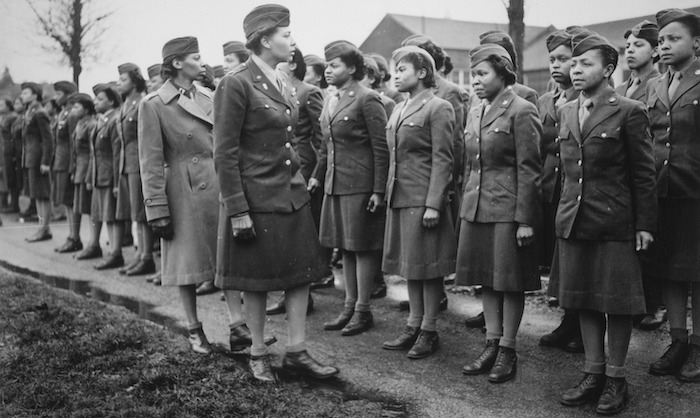
In 1942, America was going to war. The war effort would be total, all-consuming. That included new roles for women. Much has been made of women joining the workforce while so many of America’s men were in the Army or the Navy. While pre-WWII women have always worked (only the rich could afford to leave a potential wage-earner un-utilized), it is certainly the case that during WWII, American women burst onto the scene in previously male-dominated fields, like heavy industry.
Less has been made, perhaps unfairly, of the role of women in the Services. In 1942, Congress created the Women’s Army Auxiliary Corps (the WAAC), later reorganized as the Women’s Army Corps (the WAC). The Navy soon followed with the WAVES. For the first time, women would be permitted to join the U.S. military as uniformed service members with rank and title, albeit in gender-segregated units. WAC units were kept as far from the front lines as possible, but every job done by a WAC freed up a male soldier for something closer to combat duty. By modern standards this idea is absurd, but given the cultural constraints of the time, it was a pretty good system. The vast majority of soldiers in modern warfare work in support roles needed to make the combat troops effective. And if you’re going to declare that half your population cannot see combat and cannot serve side-by-side with those who can, you may as well put them to work in their own support units.
The WACs and WAVES don’t get much attention these days. Part of that’s because the programs were never large. And a big part of that is because the WACs and WAVES were undermined almost from the start. Based on absolutely no evidence, a newspaper columnist started publishing articles claiming the WACs and WAVES were bastions of immorality, little more than brothels in uniform. The claim aligned with the prejudices of his readers. It spread and became entrenched in the popular consciousness. Female recruitment plummeted (there was no female draft), commanders did not request WAC units to support them, and what could have been a mass movement towards gender equality was sabotaged by one man with a megaphone who loved money and attention more than beating the Nazis.
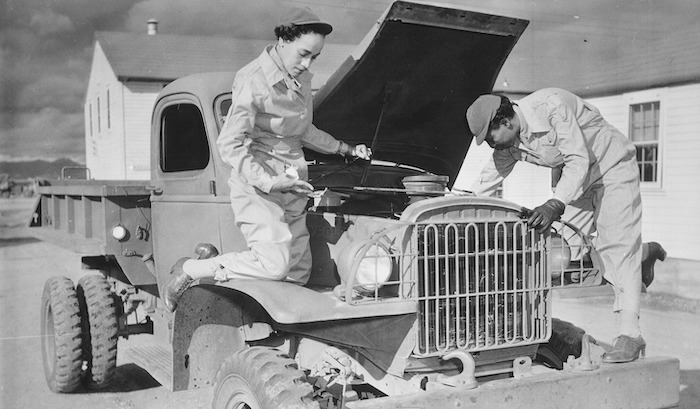
The U.S. military was also racially segregated in WWII. Black soldiers were kept in their own units and largely used as cooks, truck drivers, ditch-diggers, and in other roles that were absolutely necessary but carried no prestige. Black WACs, then, had it doubly hard. While white WACs could be sent to work as telephone operators or paperwork processors, such roles were largely off-limits to black soldiers. By the end of 1944, no black WAC unit had been deployed overseas. Instead, black WACs piled up unused in stateside holding units. This drew the ire of the black press. “These women are Americans too,” they argued. “Why should they be kept out of the fight for democracy?” For the War Department to cave to this pressure would be an easy PR win with the black community, and in early 1945, the 6888th Central Postal Directory Battalion was on its way to Birmingham, England.
The unit’s commander was Major Charity Adams, a highly-regarded officer who’d spent three years leading units that trained other WACs. Now she was commanding the first unit of black women the military ever sent overseas. By coincidence, Major Adams held several other ‘firsts’. By virtue of having been in the first WAC officer candidate class (officer boot camp) and having a last name starting with ‘A’ (ceremonies go in alphabetical order), Adams had been the first black WAC and was probably the first black woman to hold an officer’s commission in the U.S. military. And for a brief moment after her promotion to Lieutenant Colonel at the end of the war, Adams would be the highest-ranking black woman in the U.S. military.
The job of the 6888th was to take mail coming from the United States to the European Theater of Operations and forward it to the specific soldier to which it was addressed. This was no easy task. For one, a lot of folks stateside were writing addresses in the vein of “Bobby, U.S. Army, Europe”, which was hardly helpful. For another, soldiers were being moved constantly. Every time a soldier was moved, he was supposed to fill out what amounted to a change-of-address form so his mail could follow him, but front-line soldiers were moving multiple times a day, so a lot of mail slipped through the cracks. The 6888th maintained an enormous catalogue of index cards with each soldier’s name, serial number, and current forwarding address. A soldier from the 6888th took each package received, cross-checked it against the index cards, wrote the updated address on the package, and sent it on. When the package reached its destination and the addressee was inevitably no longer present, the receiving mail officer would either write the new address on the package and send it along, or would return it to the 6888th. Packages sometimes got so covered in writing that the 6888th had to put new covers on them to make room for new addresses. If a package couldn’t be delivered after bouncing around Europe for thirty days, it was returned to the United States.
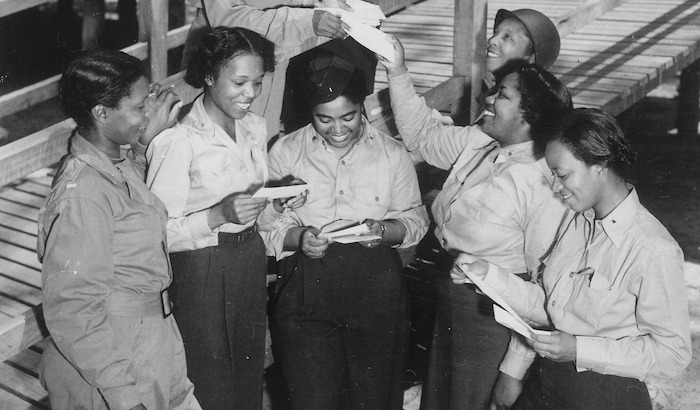
The unit that had been doing the job before the 6888th arrived in Birmingham wasn’t very good at it. Mountains of mail had piled up, unforwarded and unreturned. There were six airplane hangers full of Christmas presents that had been hastily shipped back to Birmingham during the Battle of the Bulge three months earlier, when the entire Allied line had been forced backwards. So in addition to forwarding all the new mail, the 6888th had to go through all the old mail and forward it along too, often to men who had been killed months earlier. The 6888th worked around the clock in three eight-hour shifts, averaging 65,000 parcels per shift: six million parcels a month.
All sorts of foibles and obstacles came with the job of being the first black, female unit on the scene. My personal favorite is appearance and hygiene. For white, male American soldiers, there was no shortage of razors and pomade. But hair and beauty products for black women were simply unavailable in 1945 Birmingham. So Adams directed her officers to spend much of their morale budget on setting up a beauty salon. The soldiers were able to import what they needed from newly-liberated France. France had many more black citizens than Britain and a thriving black beauty scene, represented most famously by the world-renowned dancer (and Resistance spy!) Josephine Baker. Word that the 6888th had a real salon soon got out, and black women working for the Red Cross and other American organizations began flocking to the 6888th from all across England.
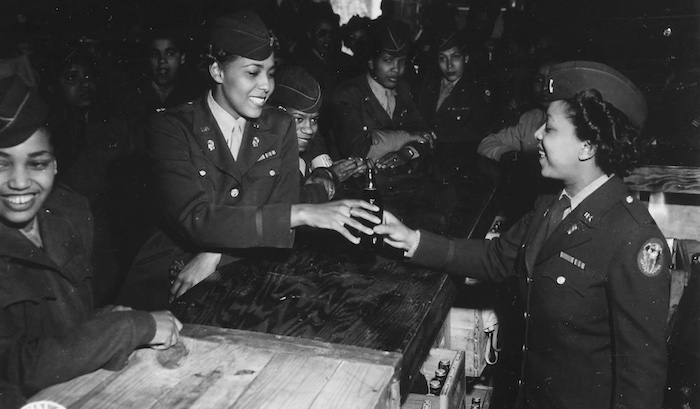
There was plenty of prejudice to deal with too: racism particularly from white soldiers and sexism from soldiers of all races. For all that the purpose of the WAC was to free up male soldiers for the war effort, an awful lot of those male soldiers bristled at being supported by women. In one incident, a general in the chain of command above the 6888th (Adams politely refuses to give us his name) came by to inspect the unit. He inspected all the sorting facilities and the barracks, watched the soldiers at their work, and could find no fault. But then came time to inspect the soldiers on parade. Only one-third of the 6888th was ordered to appear for this inspection. Remember, the soldiers were working in three shifts. One-third of the 6888th was working. One-third was asleep. That left one-third off-duty and awake, and that’s who was ordered to show up and show off their marching skill. The inspecting general flipped his lid. He was furious at this apparent show of disrespect.
Now, some context. The idea of military marching and formations is, on the face of it, a little bizarre. Goodness knows that when I was in the Navy, I hated marching, formations, passing in review, and all that nonsense. It’s all just a distraction from your actual job. Drill is a useful tool for teaching teamwork and instinctive obedience to orders, but for experienced service members, it really seems like a waste of everyone’s time. But then I’ve never been a pomp and ceremony guy, so what do I know? I’m clearly not the target audience.
But allowances are made. Everyone understands that the actual mission is more important than customs and inspections. The mission (in this case, sorting mail) does not stop just because some muckety-muck is coming by to take a peek. And while the military’s attitude towards sleep is disjointed and often stupid, even on state-side duty soldiers on night watch are often excepted from appearing in formations and whatnot when they should be sleeping. For a general in Europe in World War Two to believe that all work should stop and everyone should wake up just because he was in town would be nonsensical – but the next bit makes it all make sense.
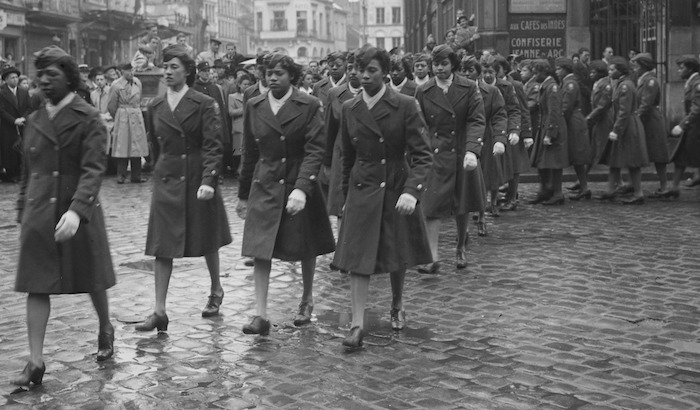
The general declared, loud enough that everyone at the formation could hear, “I tell you what I’m going to do, Major Adams. I’m going to send a white first lieutenant down here to show you how to run this unit.” Major Adams’ response was immediate: “Over my dead body, sir.” The general left, livid. That night, Major Adams got a call informing her that the general was preparing to court-martial her for disobeying a direct order.
One of the biggest skills that separates good majors (and above) from bad ones is the ability to play politics. Major Adams was good at it. She pulled up some documents that Supreme Headquarters Allied Expeditionary Force (SHAEF) had issued earlier in the war. Commanders were to avoid using racially-divisive language so as not to give the impression to America’s allies that there was disharmony in the ranks. SHAEF did nothing to address said disharmony; SHAEF just didn’t want America to look bad in front of the Europeans. Major Adams started the process of drawing up court-martial paperwork against her general for violating a SHAEF directive. Now, the charges wouldn’t have stuck, and Major Adams knew it. Those documents weren’t actually directives, just guidelines. But the dueling court-martials would have made the general look bad, and politics are all about appearances. The general dropped his threat of a court-martial, and so did Major Adams.
This story has a surprising coda. Despite their difficulties, the two remained in the same chain of command for the rest of the war. The general was unfailingly friendly and courteous to Major Adams, who didn’t want to press her luck by inquiring why. After victory in Europe, American soldiers were initially ordered home in ones and twos, not wholesale by unit. The general swung by the 6888th to have a private chat:
“Adams, I’ve received my orders to return to the States. Otherwise, I would not be here. It’s not easy for me to say what I’ve come to say. Working with you has been quite an education for me, especially about Negroes.” (This was the accepted term at the time; ‘black’ was an insult.) “The only Negroes I have ever known personally were those who were in the servant capacity or my subordinates in the Army. It’s been a long time since anyone challenged me, black or white, but you took me on. You outsmarted me and I am proud that I know you. I would not have told you this if I thought I would ever see you again.”
There are about ten thousand ways that confession can be read. I leave each reader to their own interpretation.
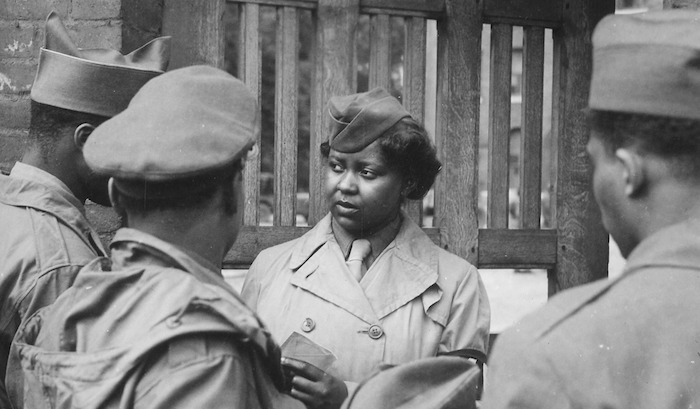
In the midst of this whole remarkable story, one detail stood out to me as incredibly gameable: six airplane hangers full of undelivered Christmas presents. In the process of filing the serial numbers off this story to insert into your fictional campaign world, I’d combine those six hangers into one enormous warehouse. Then I’d have some things escape from or leak out of some of those packages. Maybe one of the packages contained a robot that’s gone haywire from loneliness and has broken out to look for flesh to rend. Maybe one had some alchemical pastes that have now been permitted to mature well beyond their expiration date and have turned into a carnivorous ooze. Maybe rats got in to eat the Christmas cookies and have grown big as dogs. Whatever it is, it’s well beyond the capabilities of a postal unit to deal with, so your version of Major Adams asks the party to venture into this warehouse full of mysterious parcels to hunt down the monster(s) loose inside. Naturally there’s other weirdness inside too. Two packages containing machines that ought never have been permitted to come close to one another were piled one atop another, and now they’re quantum entangled and displaying weird properties. A gangster who mailed himself to the front to establish a new franchise for his syndicate only packed two weeks of food, and his rotting corpse is making it hard to track the alchemical ooze by smell.
I’ve written before about my love of complications: spicing up straightforward plots by dropping something unrelated and messy atop them that will react to the party’s actions in ways that make the PCs’ lives harder. The inspection by the asshole general is a terrific complication. The PCs have almost snuck up on the robot when a door swings open at the far end of the warehouse and some general starts shouting, “I don’t care if they’re in the middle of something, Major! I said I was going to inspect your facility, and I’m going to inspect it!” This attracts the robot, who’s attracted in the direction of the shouting. Further commotion will attract the rats, and it’s up to the PCs to decide who they want to keep alive and why.
You can also have thieves break into the warehouse mid-mission, or maybe the PCs know about a special package somewhere in the warehouse that they’d like to heist themselves.
–
Source: One Woman’s Army: A Black Officer Remembers the War by Charity Adams Earley (1995)
(Also, I’m gonna put a note way down at the bottom here that a 21st-century reader might not consider all the women who served with the 6888th to be ‘black’, and indeed the word was not in widespread use at the time except as an insult. The 6888th was a ‘colored’ or ‘negro’ unit, and included some Puerto Rican women, Mexican women, and others. As with any social construct, race is complicated and fluid. The way people interact with the construct changes not only across time and space, but also by context. People are complicated.)

Finally, an embarrassing note. Apparently my email contact form hasn’t worked in several months. So if you reached out to me using the contact form and didn’t hear back, that’s why! This is particularly embarrassing given that in last week’s post I said that if you’re going to Gen Con and want to play some Ballad Hunters off the books (all the events are sold out), you should hit me up. So if you had hit me up about it, I didn’t hear it because I’m a dummy.
–
Check out Shanty Hunters, my award-winning TTRPG about collecting magical sea shanties in the year 1880, then singing them at the table with your friends. The lyrics of the shanties come to life and cause problems for you and for the crew of the ship you sail aboard. It’s up to you to find clues in the song and put things right!







